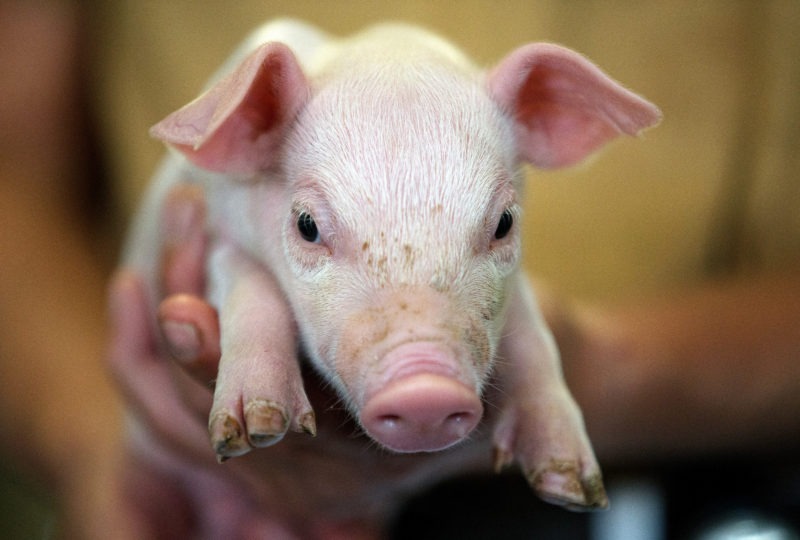This little piggy went to court: German piglets ‘sue over castration’
The painful procedure has become increasingly controversial in Europe and has been banned in Sweden, Norway and Switzerland (AXEL HEIMKEN)
<p>Berlin (AFP) – Little piggies go to market, but in Germany they also go to court.</p><p>In a legal first, animal rights activists have asked Germany’s top court to ban the practice of castrating young male pigs without anaesthetic — with the piglets themselves listed as the plaintiffs.</p><p>The painful procedure has become increasingly controversial in Europe and has been banned in Sweden, Norway and Switzerland.</p><p>Farmers argue that the castration of piglets a few days after birth is necessary to prevent "boar taint", the occasional occurrence of a foul smell when cooking pork from male pigs past puberty.</p><p>The German parliament outlawed castration without pain relief in 2013 but it offered farmers a five-year transition period to help them adapt to the change — a timeline that was extended last year until 2021.</p><p>Outraged by the inaction, the PETA campaign group filed a lawsuit with Germany’s Constitutional Court in November on behalf of the baby pigs.</p><p>The group wants judges to recognise that pigs have rights similar to human rights and that these are being violated by the "cruel act" of castration without pain relief.</p><p>"Non-human entities like companies and associations have legal personhood. So why not animals too?" said lawyer Cornelia Ziehm, who is supporting PETA in representing the piglets in court.</p><p></p><p>- ‘Little chance of succeeding’ -</p><p></p><p>PETA argues that under German law, animals cannot be harmed without reasonable explanation.</p><p>"The castration of piglets — with or without anaesthesia — is in clear violation of this, giving Germany’s male piglets only one option: to sue for the enforcement of their rights in court," the group said in a statement.</p><p>The crux of the case is their argument that in Germany "everyone" (jedermann) can file a constitutional complaint if they believe their basic rights have been violated — even a pig.</p><p>But Jens Buelte, a law professor at Mannheim university, doubted whether the judges in Karlsruhe would see it the same way.</p><p>"Animals do not have their own rights under German law," he said, giving PETA’s lawsuit "little chance of succeeding". </p><p></p><p>- Monkey selfie -</p><p></p><p>It is not the first time campaign groups have filed a case on behalf of animals.</p><p>PETA made global headlines in 2015 when it asked an American court to grant a macaque the copyright to a selfie it snapped on a wildlife photographer’s camera.</p><p>The picture of the broadly grinning monkey went viral but the court eventually ruled that animals cannot bring copyright infringement suits.</p><p>PETA condemned the verdict, saying the monkey was "discriminated against simply because he’s a nonhuman animal".</p><p>However, in Argentina in 2016 a judge ordered Cecilia the chimpanzee to be released from Mendoza Zoo after agreeing with activists that she was entitled to basic rights and her solitary confinement was unlawful.</p><p></p><p>- Alternatives -</p><p></p><p>German farmers, who remove testicles from roughly 20 million piglets each year, have long resisted the push to end castration without anaesthesia.</p><p>They say there is a lack of workable alternatives to tackle boar taint, in an industry already struggling with fierce foreign competition.</p><p>Local anaesthesia and gene editing are not yet viable or too expensive, they say, and would raise the cost of pork in a country famous for its love of schnitzel and sausage.</p><p>The government agreed in late 2018 to give the farmers a final two-year extension before the ban takes effect — a decision decried by the opposition Greens and far-left Die Linke, who argued it put the interests of the meat industry above animal protection.</p><p>Some German pork producers are pinning their hopes on a vaccine that requires just two injections to prevent boar taint — already a popular alternative abroad.</p><p>A pilot project involving 100,000 German piglets is currently ongoing, though critics say the vaccines are costly too. </p><p>A similar debate is raging in France, where agriculture minister Didier Guillaume recently said castration of piglets without pain relief should be banned by the end of 2021.</p><p></p>
Disclaimer: Validity of the above story is for 7 Days from original date of publishing. Source: AFP.


